Burt A. The Evolution of the British Empire and Commonwealth From the American Revolution
Подождите немного. Документ загружается.

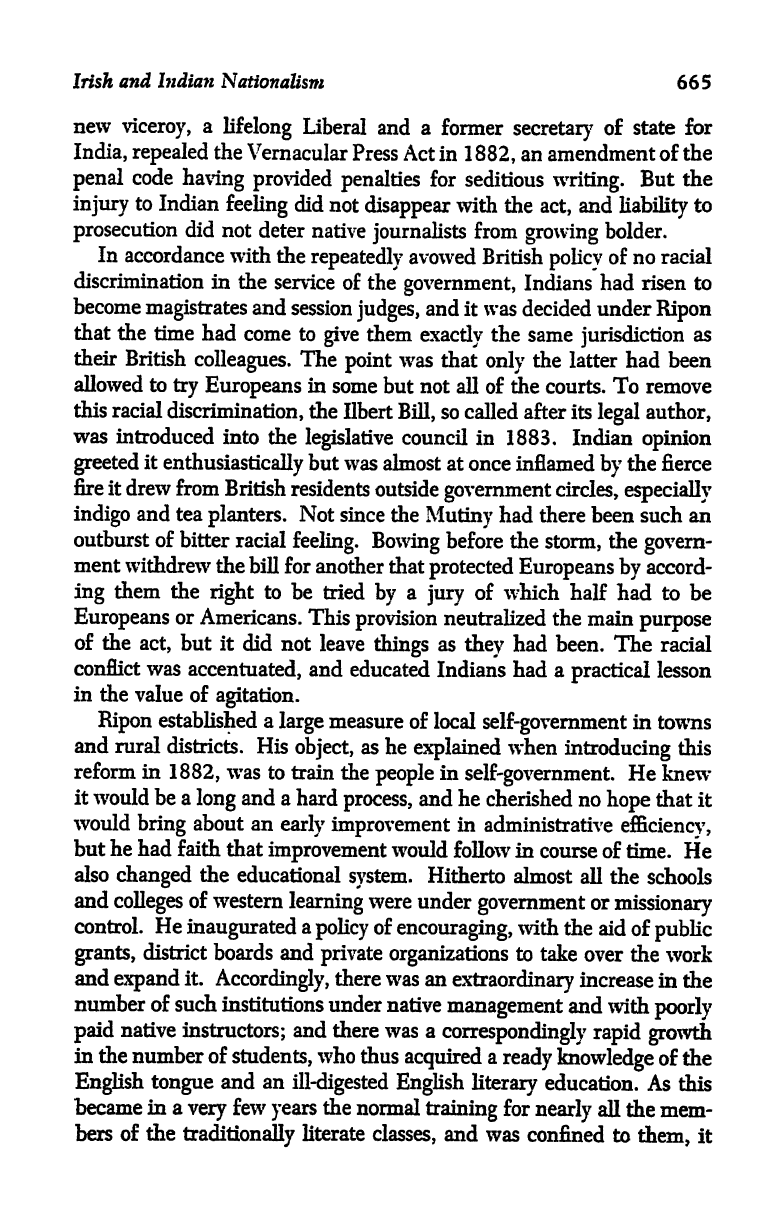
Irish
and
Indian
Nationalism
665
new
viceroy,
a
lifelong
Liberal
and
a
former
secretary
of
state for
India,
repealed
the
Vernacular
Press
Act in
1882,
an amendment
of
the
penal
code
having
provided
penalties
for
seditious
writing.
But
the
injury
to
Indian
feeling
did
not
disappear
with
the
act,
and
liability
to
prosecution
did
not
deter
native
journalists
from
growing
bolder.
In
accordance
with
the
repeatedly
avowed British
policy
of no
racial
discrimination in
the
service
of the
government,
Indians had risen
to
become
magistrates
and
session
judges,
and
it
was
decided
under
Ripon
that
the
time
had come
to
give
them
exactly
the same
jurisdiction
as
their
British
colleagues.
The
point
was that
only
the
latter
had been
allowed to
try
Europeans
in
some
but
not
all of
die
courts.
To remove
this
racial
discrimination,
the
Ilbert
Bill,
so called
after
its
legal
author,
was
introduced into the
legislative
council in 1883.
Indian
opinion
greeted
it
enthusiastically
but was
almost at
once inflamed
by
the fierce
fire
it
drew from
British
residents
outside
government
circles,
especially
indigo
and
tea
planters.
Not
since the
Mutiny
had
there
been such
an
outburst
of
bitter
racial
feeling. Bowing
before the
storm,
the
govern-
ment
withdrew
the
bill
for another that
protected
Europeans by
accord-
ing
them the
right
to
be tried
by
a
jury
of which
half had to
be
Europeans
or
Americans.
This
provision
neutralized
the
main
purpose
of the
act,
but it
did not
leave
things
as
they
had been. The
racial
conflict
was
accentuated,
and
educated
Indians had a
practical
lesson
in
the
value
of
agitation.
Ripon
established a
large
measure
of
local
self-government
in
towns
and rural
districts.
His
object,
as he
explained
when
introducing
this
reform in
1882,
was
to train
the
people
in
self-government.
He
knew
it
would be a
long
and a
hard
process,
and he
cherished no
hope
that
it
would
bring
about an
early
improvement
in
administrative
efficiency,
but
he
had faith that
improvement
would
follow
in
course
of time.
He
also
changed
the
educational
system.
Hitherto
almost all
the
schools
and
colleges
of
western
learning
were
under
government
or
missionary
control. He
inaugurated
a
policy
of
encouraging,
with
the
aid
of
public
grants,
district boards and
private
organizations
to take
over
the work
and
expand
it.
Accordingly,
there was
an
extraordinary
increase
in
the
number of such
institutions under
native
management
and
with
poorly
paid
native
instructors;
and
there was a
correspondingly
rapid
growth
in the number of
students,
who
thus
acquired
a
ready
knowledge
of
the
English tongue
and
an
ill-digested
English
literary
education.
As
this
became
in
a
very
few
years
the
normal
training
for
nearly
all the
mem-
bers of
the
traditionally
literate
classes,
and was
confined to
them,
it
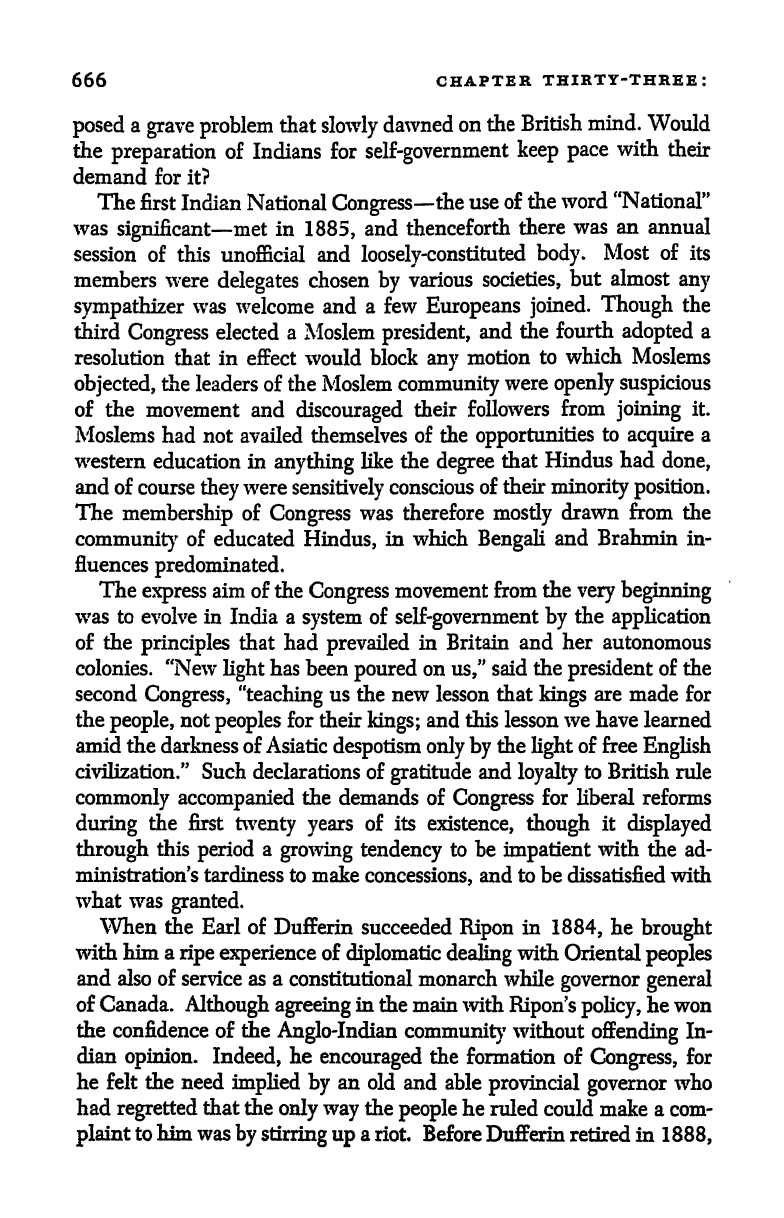
666
CHAPTER
THIRTY-THREE:
posed
a
grave
problem
that
slowly
dawned
on
the
British
mind.
Would
the
preparation
of Indians for
self-government
keep
pace
with
their
demand for it?
The
first Indian National
Congress
the
use of
the
word
"National"
was
significant
met in
1885,
and
thenceforth
there
was an
annual
session
of this unofficial
and
loosely-constituted
body.
Most
of
its
members were
delegates
chosen
by
various
societies,
but
almost
any
sympathizer
was
welcome
and
a
few
Europeans
joined. Though
the
third
Congress
elected
a
Moslem
president,
and
the
fourth
adopted
a
resolution
that
in
effect would
block
any
motion
to
which
Moslems
objected,
the
leaders
of
the
Moslem
community
were
openly
suspicious
of the
movement
and
discouraged
their followers
from
joining
it.
Moslems
had not availed themselves
of the
opportunities
to
acquire
a
western education in
anything
like the
degree
that Hindus
had
done,
and
of course
they
were
sensitively
conscious
of
their
minority position.
The
membership
of
Congress
was
therefore
mostly
drawn from the
community
of
educated
Hindus,
in which
Bengali
and
Brahmin
in-
fluences
predominated.
The
express
aim
of
the
Congress
movement
from
the
very
beginning
was to
evolve in India a
system
of
self-government
by
the
application
of the
principles
that
had
prevailed
in
Britain
and
her
autonomous
colonies. "New
light
has
been
poured
on
us,"
said
the
president
of
the
second
Congress,
"teaching
us
the
new
lesson
that
kings
are
made for
the
people,
not
peoples
for their
kings;
and
this lesson we have
learned
amid the
darkness of Asiatic
despotism only by
the
light
of
free
English
civilization." Such
declarations of
gratitude
and
loyalty
to
British
rule
commonly
accompanied
the
demands of
Congress
for
liberal
reforms
during
the
first
twenty
years
of its
existence,
though
it
displayed
through
this
period
a
growing tendency
to
be
impatient
with the ad-
ministration's tardiness
to
make
concessions,
and to be dissatisfied with
what was
granted.
When the Earl
of Dufferin
succeeded
Ripon
in
1884,
he
brought
with him
a
ripe
experience
of
diplomatic
dealing
with
Oriental
peoples
and
also
of service as a
constitutional monarch
while
governor
general
of Canada.
Although agreeing
in
the main with
Ripon's
policy,
he won
the confidence
of
the
Anglo-Indian
community
without
offending
In-
dian
opinion.
Indeed,
he
encouraged
the
formation of
Congress,
for
he felt the need
implied
by
an
old
and
able
provincial
governor
who
had
regretted
that the
only way
the
people
he
ruled
could make
a
com-
plaint
to
him
was
by
stirring up
a
riot. Before Dufferin
retired in 1
888,
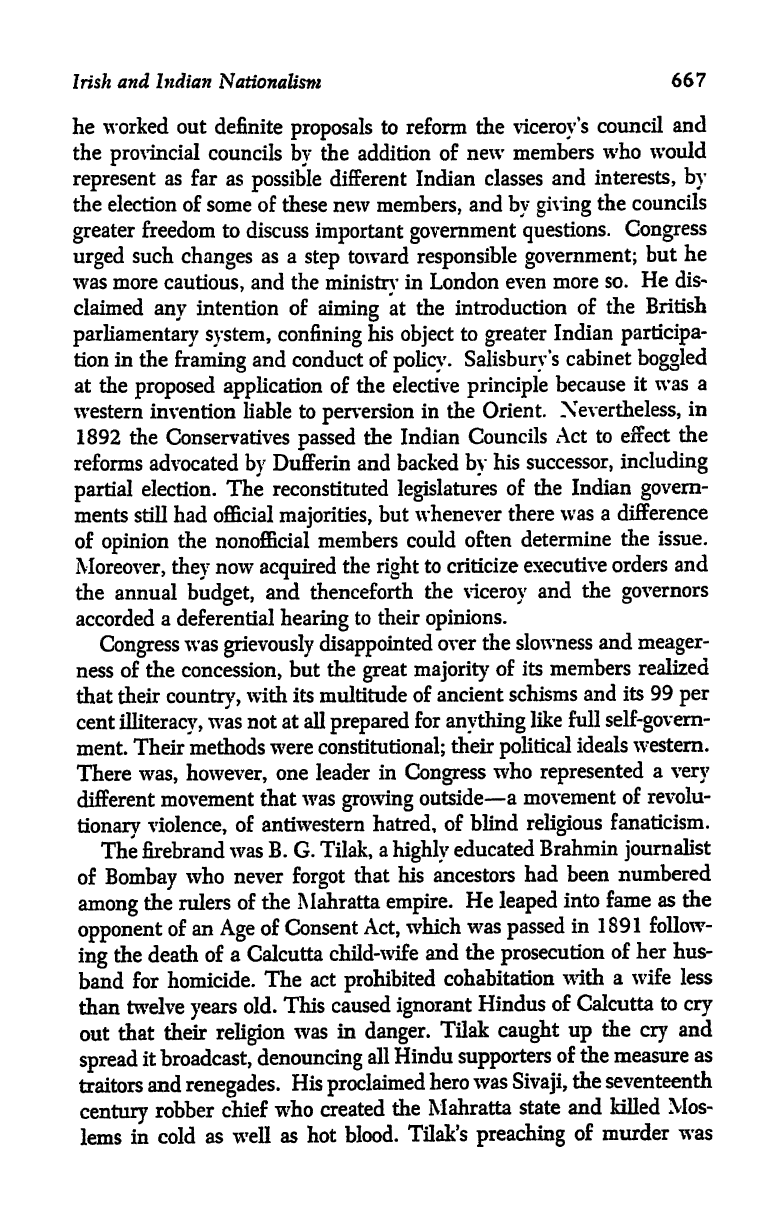
Irish
and
Indian
Nationalism
667
he worked
out
definite
proposals
to
reform
the
viceroy's
council
and
the
provincial
councils
by
the
addition
of
new
members
who
would
represent
as
far
as
possible
different Indian
classes
and
interests,
by
the election
of
some of these new
members,
and
by
giving
the
councils
greater
freedom to
discuss
important
government
questions.
Congress
urged
such
changes
as a
step
toward
responsible
government;
but
he
was
more
cautious,
and the
ministry
in
London
even
more
so.
He
dis-
claimed
any
intention
of
aiming
at
the
introduction
of
the
British
parliamentary
system,
confining
his
object
to
greater
Indian
participa-
tion
in
the
framing
and conduct of
policy.
Salisbury's
cabinet
boggled
at
the
proposed
application
of
the elective
principle
because
it
was
a
western
invention
liable to
perversion
in
the
Orient.
Nevertheless,
in
1892 the
Conservatives
passed
the
Indian
Councils
Act to
effect
the
reforms
advocated
by
Dufferin
and backed
by
his
successor,
including
partial
election.
The
reconstituted
legislatures
of
the Indian
govern-
ments
still
had official
majorities,
but
whenever
there
was a difference
of
opinion
the nonofficial
members
could
often
determine
the
issue.
Moreover,
they
now
acquired
the
right
to
criticize
executive
orders
and
the
annual
budget,
and
thenceforth
the
viceroy
and
the
governors
accorded
a
deferential
hearing
to
their
opinions.
Congress
was
grievously
disappointed
over
the slowness
and
meager-
ness
of the
concession,
but
the
great
majority
of
its
members
realized
that
their
country,
with its multitude
of
ancient
schisms
and
its
99
per
cent
illiteracy,
was
not
at all
prepared
for
anything
like
full
self-govern-
ment.
Their methods
were
constitutional;
their
political
ideals
western.
There
was,
however,
one leader
in
Congress
who
represented
a
very
different
movement
that
was
growing
outside
a movement
of
revolu-
tionary
violence,
of antiwestern
hatred,
of
blind
religious
fanaticism.
The
firebrand
was
B.
G.
Tilak,
a
highly
educated
Brahmin
journalist
of
Bombay
who never
forgot
that
his
ancestors
had
been
numbered
among
the rulers
of
the
Mahratta
empire.
He
leaped
into fame
as
the
opponent
of
an
Age
of
Consent
Act,
which
was
passed
in
1891
follow-
ing
the death
of
a Calcutta
child-wife
and
the
prosecution
of
her
hus-
band
for
homicide.
The act
prohibited
cohabitation
with
a
wife less
than
twelve
years
old.
This
caused
ignorant
Hindus
of Calcutta
to
cry
out
that
their
religion
was
in
danger.
Tilak
caught
up
the
cry
and
spread
it
broadcast,
denouncing
all
Hindu
supporters
of the measure
as
traitors
and
renegades.
His
proclaimed
hero
was
Sivaji,
the
seventeenth
century
robber
chief
who
created
the
Mahratta
state and
killed
Mos-
lems
in
cold
as well
as
hot
blood.
Tilak's
preaching
of
murder
was
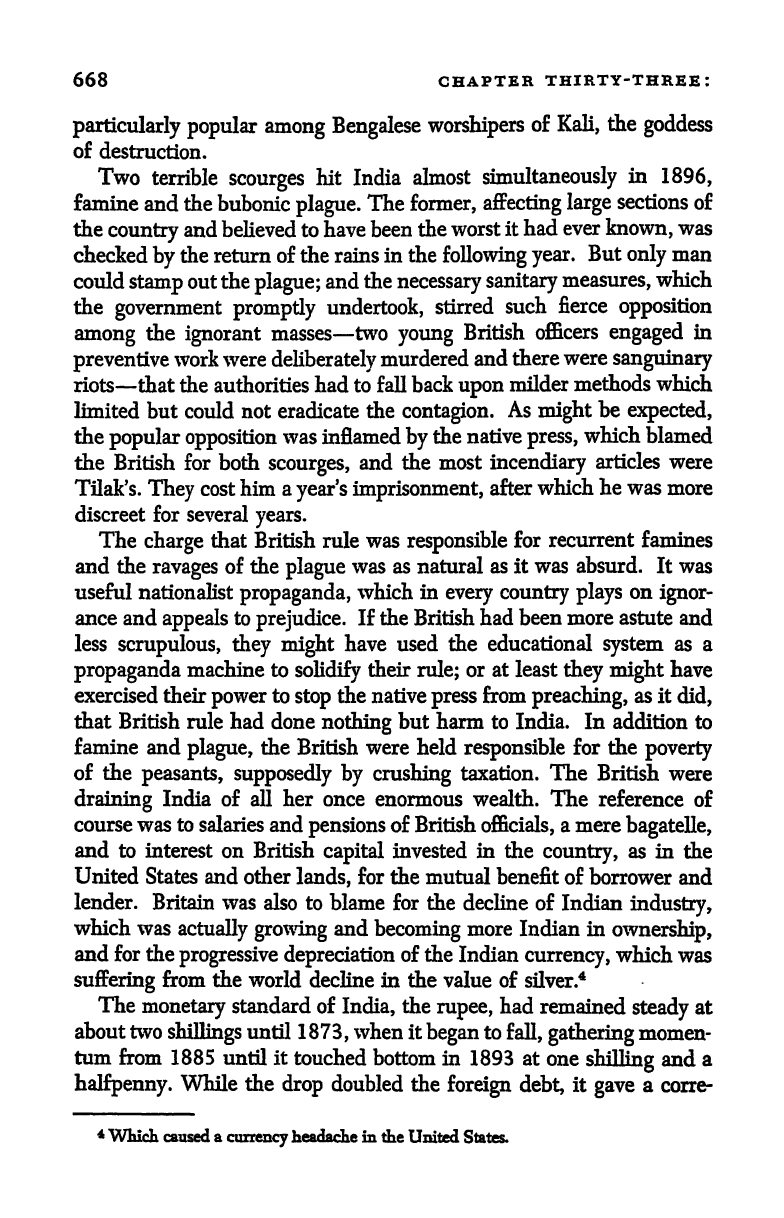
668
CHAPTER
THIRTY-THREE:
particularly
popular among
Bengalese
worshipers
of
Kali,
the
goddess
of
destruction.
Two
terrible
scourges
hit
India
almost
simultaneously
in
1896,
famine
and
the
bubonic
plague.
The
former,
affecting large
sections
of
the
country
and believed
to have been
the
worst
it
had
ever
known,
was
checked
by
the return
of
the
rains
in the
following
year.
But
only
man
could
stamp
out
the
plague;
and
the
necessary
sanitary
measures,
which
the
government promptly
undertook,
stirred
such
fierce
opposition
among
the
ignorant
masses
two
young
British
officers
engaged
in
preventive
work were
deliberately
murdered
and
there
were
sanguinary
riots
that the
authorities
had
to fall back
upon
milder
methods
which
limited but could
not eradicate the
contagion.
As
might
be
expected,
the
popular
opposition
was inflamed
by
the
native
press,
which
blamed
the British for both
scourges,
and the
most
incendiary
articles
were
Tilak's.
They
cost him
a
year's
imprisonment,
after
which he was
more
discreet for
several
years.
The
charge
that
British
rule
was
responsible
for
recurrent
famines
and the
ravages
of the
plague
was as natural
as it was
absurd.
It
was
useful nationalist
propaganda,
which
in
every
country plays
on
ignor-
ance and
appeals
to
prejudice.
If the British had been
more astute
and
less
scrupulous, they
might
have used the educational
system
as
a
propaganda
machine
to
solidify
their
rule;
or
at
least
they
might
have
exercised
their
power
to
stop
the native
press
from
preaching,
as it
did,
that
British
rule
had
done
nothing
but harm to
India.
In
addition to
famine
and
plague,
the
British
were
held
responsible
for
the
poverty
of the
peasants,
supposedly by
crushing
taxation.
The
British
were
draining
India of
all
her
once enormous wealth. The
reference
of
course was
to
salaries and
pensions
of
British
officials,
a mere
bagatelle,
and
to interest
on
British
capital
invested
in the
country,
as
in
the
United States and other
lands,
for
the
mutual benefit
of
borrower
and
lender.
Britain
was
also to blame for the
decline of Indian
industry,
which was
actually
growing
and
becoming
more Indian in
ownership,
and for the
progressive
depreciation
of the
Indian
currency,
which
was
suffering
from the
world
decline
in
the
value of
silver.
4
The
monetary
standard
of
India,
the
rupee,
had
remained
steady
at
about two
shillings
until
1
873,
when it
began
to
fall,
gathering
momen-
tum
from 1885
until
it
touched
bottom
in
1893 at
one
shilling
and
a
halfpenny.
While the
drop
doubled the
foreign
debt,
it
gave
a
corre-
*
Which caused
a
currency
headache
in
the
United
States.
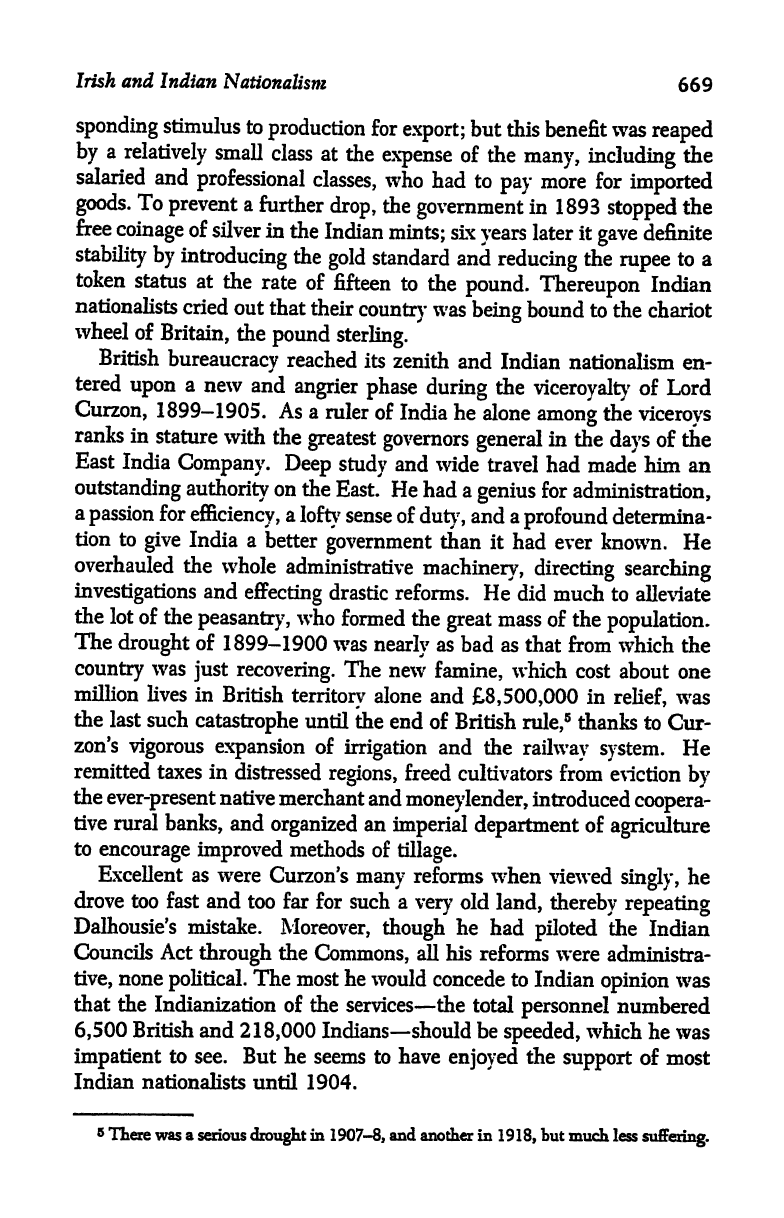
Irish
and
Indian
Nationalism
669
spending
stimulus
to
production
for
export;
but this
benefit was
reaped
by
a
relatively
small
class
at
the
expense
of
the
many,
including
the
salaried
and
professional
classes,
who had
to
pay
more
for
imported
goods.
To
prevent
a
further
drop,
the
government
in 1893
stopped
the
free
coinage
of
silver
in
the
Indian
mints;
six
years
later it
gave
definite
stability
by
introducing
the
gold
standard and
reducing
the
rupee
to
a
token
status at
the
rate
of
fifteen
to the
pound.
Thereupon
Indian
nationalists
cried out
that
their
country
was
being
bound
to
the
chariot
wheel
of
Britain,
the
pound
sterling.
British
bureaucracy
reached
its
zenith
and
Indian
nationalism en-
tered
upon
a
new
and
angrier
phase
during
the
viceroyalty
of Lord
Curzon,
1899-1905.
As
a
ruler
of
India he
alone
among
the
viceroys
ranks
in
stature with
the
greatest
governors
general
in the
days
of the
East
India
Company.
Deep
study
and
wide
travel
had made him
an
outstanding
authority
on the
East.
He had a
genius
for
administration,
a
passion
for
efficiency,
a
loft}
7
sense of
duty,
and
a
profound
determina-
tion
to
give
India
a
better
government
than it
had ever
known. He
overhauled the
whole
administrative
machinery,
directing
searching
investigations
and
effecting
drastic
reforms.
He
did much
to
alleviate
the
lot of
the
peasantry,
who
formed
the
great
mass
of
the
population.
The
drought
of
1899-1900
was
nearly
as
bad as
that from
which the
country
was
just
recovering.
The
new
famine,
which cost
about
one
million
lives in
British
territory
alone
and
8,500,000
in
relief,
was
the
last
such
catastrophe
until the
end of
British
rule,
5
thanks
to Cur-
zon's
vigorous
expansion
of
irrigation
and the
railway
system.
He
remitted
taxes
in
distressed
regions,
freed cultivators
from
eviction
by
the
ever-present
native
merchant
and
moneylender,
introduced
coopera-
tive
rural
banks,
and
organized
an
imperial
department
of
agriculture
to
encourage improved
methods
of
tillage.
Excellent
as
were
Curzon's
many
reforms
when
viewed
singly,
he
drove
too
fast
and
too far for such a
very
old
land,
thereby
repeating
Dalhousie's mistake.
Moreover,
though
he
had
piloted
the
Indian
Councils Act
through
the
Commons,
all his
reforms
were
administra-
tive,
none
political.
The
most he
would concede to
Indian
opinion
was
that the
Indianization
of
the services
the
total
personnel
numbered
6,500
British
and
218,000
Indians
should be
speeded,
which
he
was
impatient
to
see. But
he
seems to have
enjoyed
the
support
of
most
Indian
nationalists
until
1904.
5
There
was
a
serious
drought
in
1907-8,
and
another in
1918,
hut
much
less
suffering.
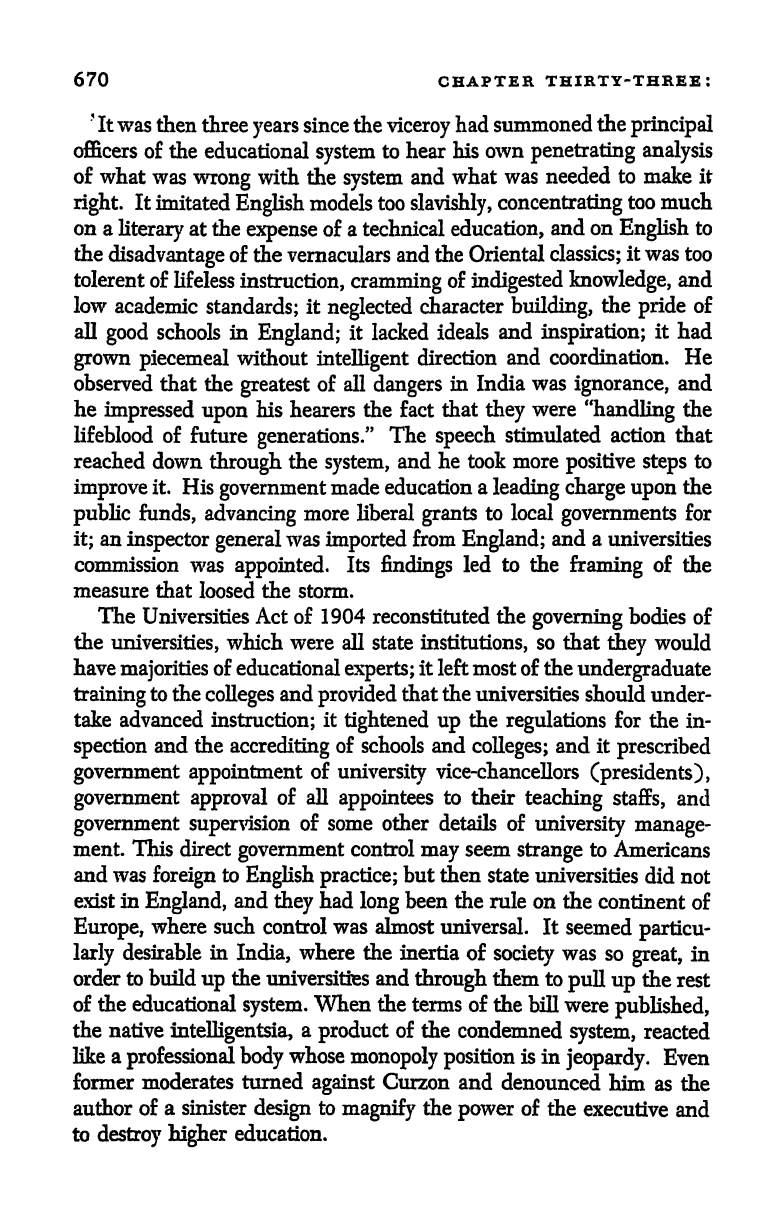
670
CHAPTER
THIRTY-THREE:
'
It
was then three
years
since the
viceroy
had
summoned
the
principal
officers of
the educational
system
to hear
his
own
penetrating
analysis
of
what
was
wrong
with
the
system
and
what
was needed
to
make
it
right.
It
imitated
English
models too
slavishly,
concentrating
too
much
on
a
literary
at
the
expense
of
a technical
education,
and on
English
to
the
disadvantage
of
the
vernaculars
and
the Oriental
classics;
it was
too
tolerent
of
lifeless
instruction,
cramming
of
indigested
knowledge,
and
low
academic
standards;
it
neglected
character
building,
the
pride
of
all
good
schools
in
England;
it lacked
ideals
and
inspiration;
it
had
grown
piecemeal
without
intelligent
direction
and
coordination. He
observed that
the
greatest
of all
dangers
in India
was
ignorance,
and
he
impressed
upon
his hearers
the
fact
that
they
were
"handling
the
lifeblood of future
generations."
The
speech
stimulated
action
that
reached down
through
the
system,
and
he
took more
positive
steps
to
improve
it.
His
government
made education
a
leading charge
upon
the
public
funds,
advancing
more
liberal
grants
to local
governments
for
it;
an
inspector
general
was
imported
from
England;
and
a
universities
commission
was
appointed.
Its
findings
led to the
framing
of
the
measure that
loosed
the
storm.
The Universities Act of
1904
reconstituted
the
governing
bodies of
the
universities,
which were all state
institutions,
so that
they
would
have
majorities
of educational
experts;
it
left most of
the
undergraduate
training
to
the
colleges
and
provided
that
the
universities
should
under-
take advanced
instruction;
it
tightened up
the
regulations
for
the in-
spection
and
the
accrediting
of schools and
colleges;
and
it
prescribed
government appointment
of
university
vice-chancellors
(presidents),
government
approval
of
all
appointees
to their
teaching
staffs,
and
government supervision
of some other details
of
university
manage-
ment.
This
direct
government
control
may
seem
strange
to
Americans
and was
foreign
to
English
practice;
but
then
state
universities
did not
exist in
England,
and
they
had
long
been
the
rule
on the
continent
of
Europe,
where
such control
was
almost universal.
It
seemed
particu-
larly
desirable
in
India,
where the
inertia
of
society
was
so
great,
in
order
to build
up
the universities
and
through
them to
pull
up
the rest
of
the
educational
system.
When the terms
of
the
bill
were
published,
the native
intelligentsia,
a
product
of the
condemned
system,
reacted
like
a
professional
body
whose
monopoly position
is
in
jeopardy.
Even
former
moderates
turned
against
Curzon
and
denounced
him
as the
author
of
a sinister
design
to
magnify
the
power
of the
executive
and
to
destroy higher
education.
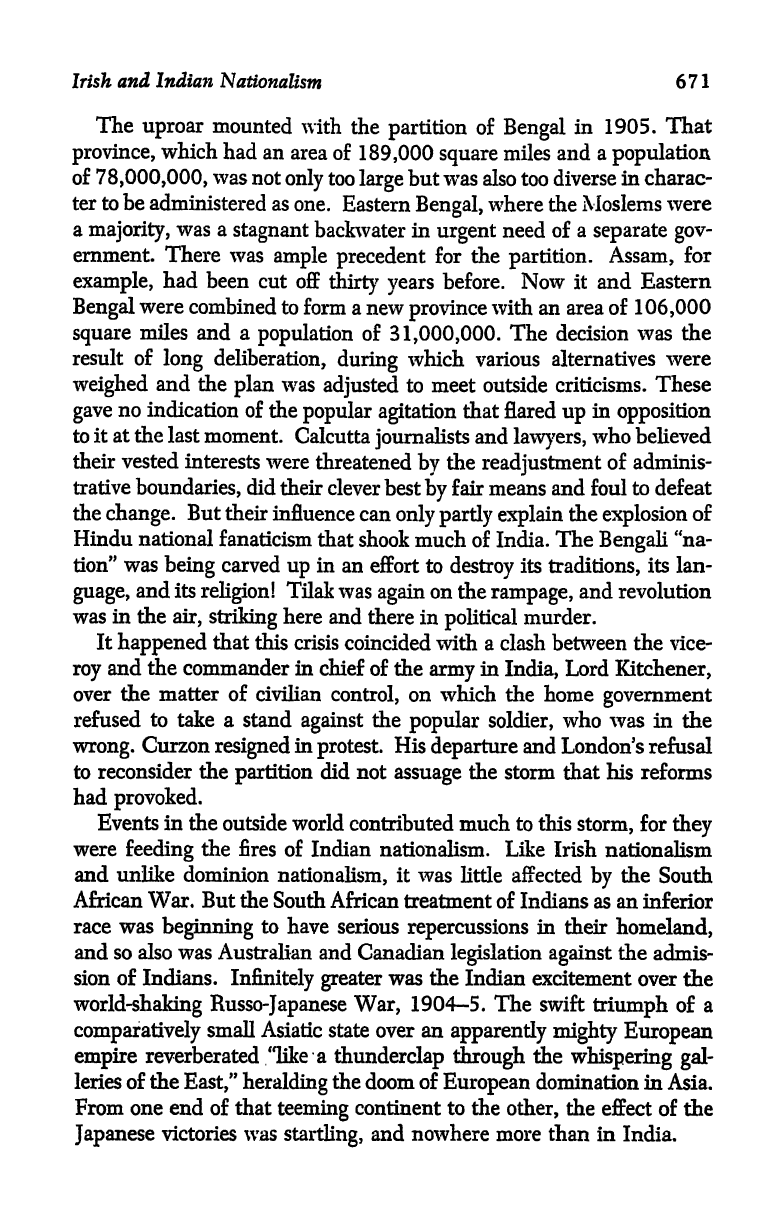
Irish
and Indian
Nationalism
671
The
uproar
mounted
with
the
partition
of
Bengal
in
1905.
That
province,
which
had an
area
of
189,000
square
miles
and a
population
of
78,000,000,
was not
only
too
large
but
was
also too
diverse
in
charac-
ter
to
be
administered as
one.
Eastern
Bengal,
where
the
Moslems
were
a
majority,
was a
stagnant
backwater
in
urgent
need of
a
separate
gov-
ernment.
There
was
ample precedent
for
the
partition.
Assam,
for
example,
had been
cut
off
thirty
years
before. Now it and
Eastern
Bengal
were
combined
to form
a
new
province
with
an area of
106,000
square
miles and
a
population
of
31,000,000.
The decision
was
the
result
of
long
deliberation,
during
which
various alternatives
were
weighed
and
the
plan
was
adjusted
to meet outside
criticisms.
These
gave
no
indication
of
the
popular
agitation
that flared
up
in
opposition
to
it
at the
last
moment.
Calcutta
journalists
and
lawyers,
who believed
their vested
interests were
threatened
by
the
readjustment
of
adminis-
trative
boundaries,
did
their
clever best
by
fair means
and foul
to defeat
the
change.
But
their
influence can
only
partly
explain
the
explosion
of
Hindu national
fanaticism
that shook
much of India.
The
Bengali
"na-
tion"
was
being
carved
up
in
an
effort
to
destroy
its
traditions,
its
lan-
guage,
and
its
religion!
Tilak
was
again
on
the
rampage,
and
revolution
was
in the
air,
striking
here
and
there in
political
murder.
It
happened
that
this crisis
coincided with a
clash between
the vice-
roy
and
the
commander in
chief
of the
army
in
India,
Lord
Kitchener,
over
the
matter
of
civilian
control,
on
which
the home
government
refused
to
take
a
stand
against
the
popular
soldier,
who
was
in
the
wrong.
Curzon
resigned
in
protest.
His
departure
and
London's
refusal
to reconsider the
partition
did
not
assuage
the
storm
that his
reforms
had
provoked.
Events
in the
outside world
contributed
much
to
this
storm,
for
they
were
feeding
the
fires of
Indian nationalism.
Like
Irish
nationalism
and unlike
dominion
nationalism,
it
was little affected
by
the
South
African War.
But
the
South
African
treatment
of
Indians
as an
inferior
race
was
beginning
to
have serious
repercussions
in
their
homeland,
and so
also
was Australian
and Canadian
legislation against
the
admis-
sion
of Indians.
Infinitely
greater
was
the
Indian excitement
over
the
world-shaking
Russo-Japanese
War,
1904-5.
The swift
triumph
of
a
comparatively
small
Asiatic
state
over an
apparently
mighty
European
empire
reverberated "like
a
thunderclap
through
the
whispering gal-
leries of
the
East,"
heralding
the
doom
of
European
domination
in
Asia.
From one end of
that
teeming
continent
to
the
other,
the
effect of the
Japanese
victories
was
startling,
and nowhere more
than in
India,
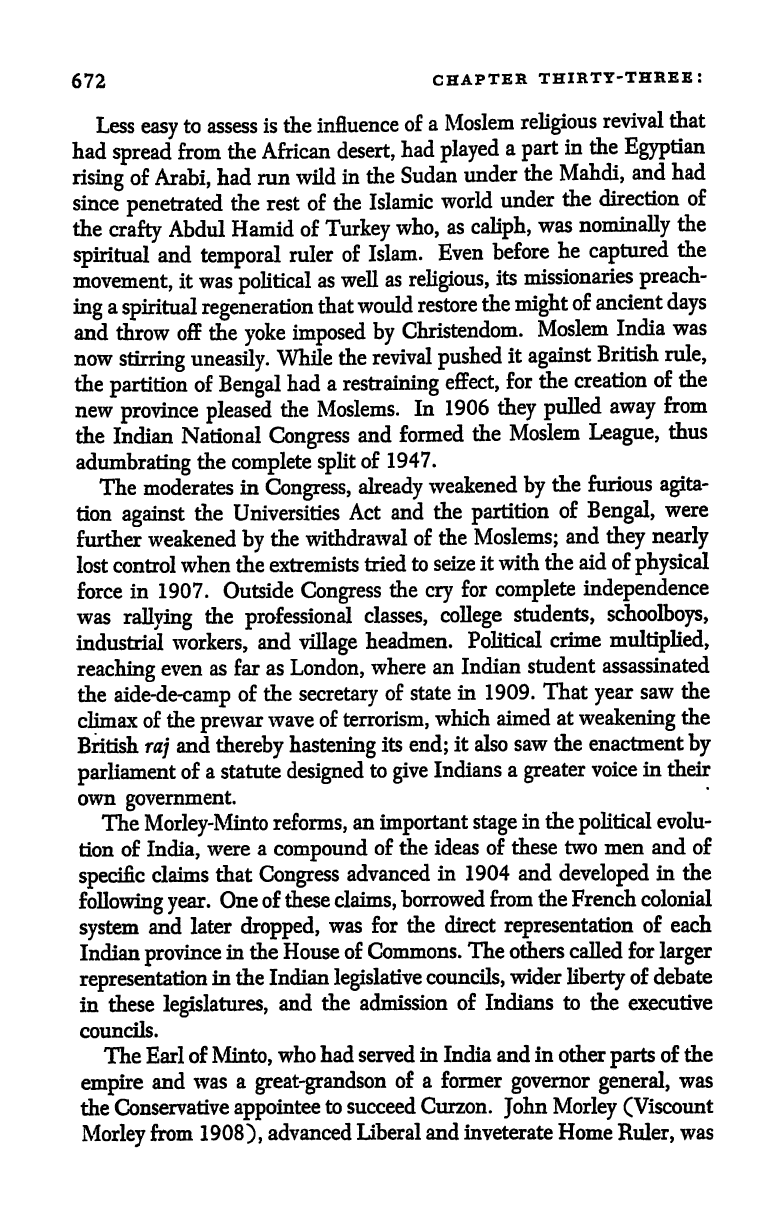
672
CHAPTER
THIRTY-THREE:
Less
easy
to assess is
the
influence
of
a Moslem
religious
revival
that
had
spread
from
the African
desert,
had
played
a
part
in
the
Egyptian
rising
of
Arabi,
had
run
wild
in
the
Sudan
under
the
Mahdi,
and had
since
penetrated
the
rest
of
the
Islamic
world
under
the
direction
of
the
crafty
Abdul
Hamid
of
Turkey
who,
as
caliph,
was
nominally
the
spiritual
and
temporal
ruler
of
Islam.
Even
before
he
captured
the
movement,
it was
political
as
well
as
religious,
its
missionaries
preach-
ing
a
spiritual
regeneration
that
would
restore
the
might
of
ancient
days
and
throw
off the
yoke
imposed
by
Christendom.
Moslem
India
was
now
stirring
uneasily.
While
the
revival
pushed
it
against
British
rule,
the
partition
of
Bengal
had
a
restraining
effect,
for
the
creation
of the
new
province pleased
the
Moslems.
In
1906
they
pulled
away
from
the Indian
National
Congress
and
formed
the
Moslem
League,
thus
adumbrating
the
complete
split
of
1947.
The moderates
in
Congress,
already
weakened
by
the furious
agita-
tion
against
the Universities
Act
and
the
partition
of
Bengal,
were
further
weakened
by
the
withdrawal
of
the
Moslems;
and
they
nearly
lost control
when
the
extremists
tried
to
seize
it
with
the
aid of
physical
force
in
1907. Outside
Congress
the
cry
for
complete
independence
was
rallying
the
professional
classes,
college
students,
schoolboys,
industrial
workers,
and
village
headmen.
Political
crime
multiplied,
reaching
even
as far as
London,
where
an Indian
student
assassinated
the
aide-de-camp
of
the
secretary
of state
in 1909.
That
year
saw
the
climax
of
the
prewar
wave
of
terrorism,
which
aimed
at
weakening
the
British
raj
and
thereby
hastening
its
end;
it also
saw the
enactment
by
parliament
of
a
statute
designed
to
give
Indians
a
greater
voice
in their
own
government.
The
Morley-Minto
reforms,
an
important stage
in the
political
evolu-
tion
of
India,
were
a
compound
of tike ideas
of
these two
men
and of
specific
claims
that
Congress
advanced
in 1904
and
developed
in
the
following
year.
One
of
these
claims,
borrowed
from
the French
colonial
system
and later
dropped,
was for
the direct
representation
of
each
Indian
province
in the House
of
Commons.
The
others
called for
larger
representation
in the Indian
legislative
councils,
wider
liberty
of debate
in these
legislatures,
and the admission
of Indians
to
the executive
councils.
The
Earl
of
Minto,
who had
served
in India and
in
other
parts
of
the
empire
and
was
a
great-grandson
of a former
governor
general,
was
the Conservative
appointee
to succeed
Curzon.
John
Morley
(Viscount
Morley
from
1908),
advanced
Liberal and inveterate
Home
Ruler,
was
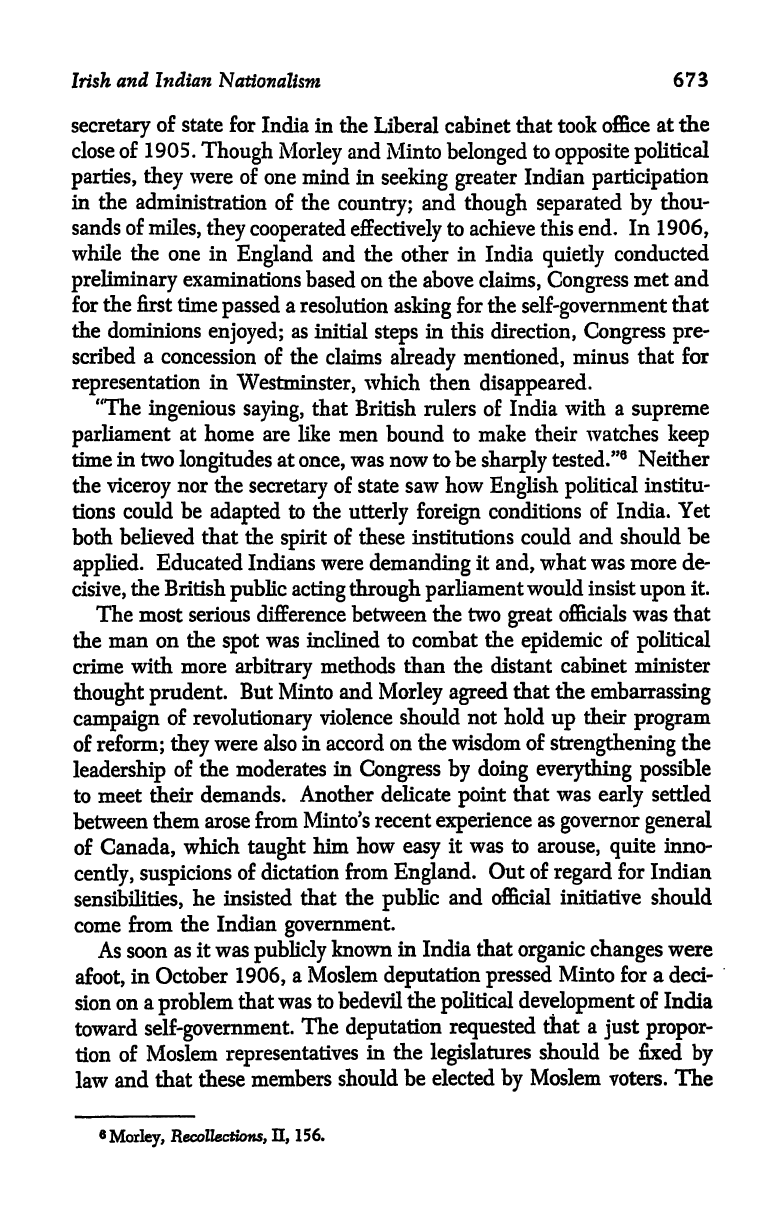
Irish
and
Indian
Nationalism
673
secretary
of
state
for
India
in the
Liberal
cabinet that
took
office
at the
close
of
1905.
Though Morley
and
Minto
belonged
to
opposite
political
parties, they
were of
one mind
in
seeking greater
Indian
participation
in the
administration
of the
country;
and
though
separated
by
thou-
sands of
miles,
they
cooperated effectively
to
achieve this end.
In
1906,
while the
one
in
England
and
the
other
in
India
quietly
conducted
preliminary
examinations
based on
the
above
claims,
Congress
met
and
for
the
first time
passed
a
resolution
asking
for
the
self-government
that
the dominions
enjoyed;
as
initial
steps
in this
direction,
Congress
pre-
scribed
a
concession of
the
claims
already
mentioned,
minus that for
representation
in
Westminster,
which then
disappeared.
"The
ingenious
saying,
that
British
rulers
of
India with
a
supreme
parliament
at
home
are like men
bound to make
their
watches
keep
time
in
two
longitudes
at
once,
was now
to be
sharply
tested."
8
Neither
the
viceroy
nor
the
secretary
of
state saw
how
English
political
institu-
tions
could
be
adapted
to die
utterly foreign
conditions
of India.
Yet
both
believed
that the
spirit
of these institutions
could
and
should
be
applied.
Educated
Indians
were
demanding
it
and,
what
was more
de-
cisive,
the
British
public
acting through
parliament
would
insist
upon
it.
The
most
serious
difference between the two
great
officials was
that
the
man on
the
spot
was
inclined
to
combat the
epidemic
of
political
crime
with more
arbitrary
methods
than
the
distant cabinet
minister
thought
prudent.
But
Minto
and
Morley agreed
that
the
embarrassing
campaign
of
revolutionary
violence
should
not
hold
up
their
program
of
reform;
they
were also in accord
on the wisdom of
strengthening
the
leadership
of the
moderates
in
Congress
by
doing everything possible
to
meet
their
demands.
Another
delicate
point
that
was
early
settled
between
them
arose
from
Minto's
recent
experience
as
governor
general
of
Canada,
which
taught
him how
easy
it was to
arouse,
quite
inno-
cently,
suspicions
of dictation
from
England.
Out of
regard
for Indian
sensibilities,
he
insisted that
the
public
and
official
initiative
should
come
from
the
Indian
government.
As soon
as
it
was
publicly
known
in India
that
organic changes
were
afoot,
in October
1906,
a
Moslem
deputation
pressed
Minto for a
deci-
sion
on
a
problem
that
was
to
bedevil
the
political development
of
India
toward
self-government.
The
deputation
requested
that
a
just
propor-
tion
of
Moslem
representatives
in the
legislatures
should
be
fixed
by
law
and
that
these
members
should
be elected
by
Moslem
voters.
The
Morley,
Recollections,
n,
156.
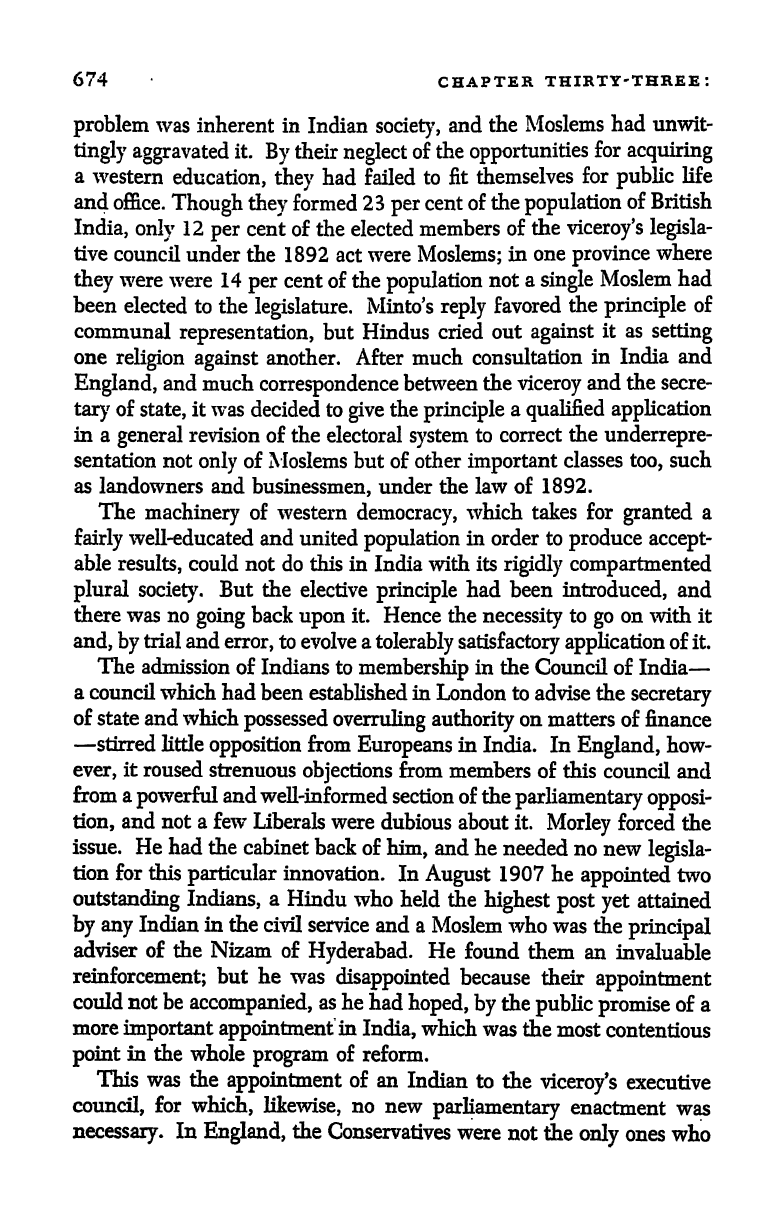
674
CHAPTER
THIRTY-THREE:
problem
was inherent in
Indian
society,
and
the
Moslems
had unwit-
tingly
aggravated
it.
By
their
neglect
of
the
opportunities
for
acquiring
a
western
education,
they
had
failed
to fit
themselves
for
public
life
and
office.
Though
they
formed
23
per
cent
of
the
population
of British
India,
only
12
per
cent
of the elected
members
of
the
viceroy's
legisla-
tive
council
under
the 1892
act
were
Moslems;
in
one
province
where
they
were
were 14
per
cent of the
population
not
a
single
Moslem had
been
elected to
the
legislature.
Minto's
reply
favored
the
principle
of
communal
representation,
but
Hindus
cried
out
against
it
as
setting
one
religion
against
another. After
much consultation
in India and
England,
and
much
correspondence
between
the
viceroy
and the secre-
tary
of
state,
it
was
decided
to
give
the
principle
a
qualified
application
in
a
general
revision
of the electoral
system
to correct
the
underrepre-
sentation
not
only
of
Moslems
but
of
other
important
classes
too,
such
as landowners
and
businessmen,
under the law
of
1892.
The
machinery
of western
democracy,
which
takes for
granted
a
fairly
well-educated and
united
population
in
order
to
produce
accept-
able
results,
could not
do this in
India
with its
rigidly
compartmented
plural
society.
But
the
elective
principle
had been
introduced,
and
there was
no
going
back
upon
it. Hence the
necessity
to
go
on with
it
and,
by
trial
and
error,
to
evolve
a
tolerably
satisfactory
application
of
it.
The
admission
of Indians to
membership
in
the Council of India
a
council which had
been established in
London
to advise the
secretary
of
state and
which
possessed
overruling authority
on
matters
of
finance
stirred
little
opposition
from
Europeans
in
India. In
England,
how-
ever,
it
roused
strenuous
objections
from
members
of this
council
and
from
a
powerful
and
well-informed section of
the
parliamentary
opposi-
tion,
and not a
few
Liberals
were
dubious
about
it.
Morley
forced
the
issue. He
had
the
cabinet
back of
him,
and he
needed
no
new
legisla-
tion
for
this
particular
innovation.
In
August
1907
he
appointed
two
outstanding
Indians,
a
Hindu
who
held
the
highest
post
yet
attained
by
any
Indian
in
the
civil service
and
a
Moslem
who
was the
principal
adviser
of the
Nizam of
Hyderabad.
He
found
them
an
invaluable
reinforcement;
but he
was
disappointed
because
their
appointment
could
not be
accompanied,
as
he
had
hoped,
by
the
public
promise
of a
more
important appointment
in
India,
which
was
the
most
contentious
point
in
the whole
program
of
reform.
This was
the
appointment
of
an
Indian to
the
viceroy's
executive
council,
for
which,
likewise,
no new
parliamentary
enactment
was
necessary.
In
England,
the
Conservatives were
not
the
only
ones
who
